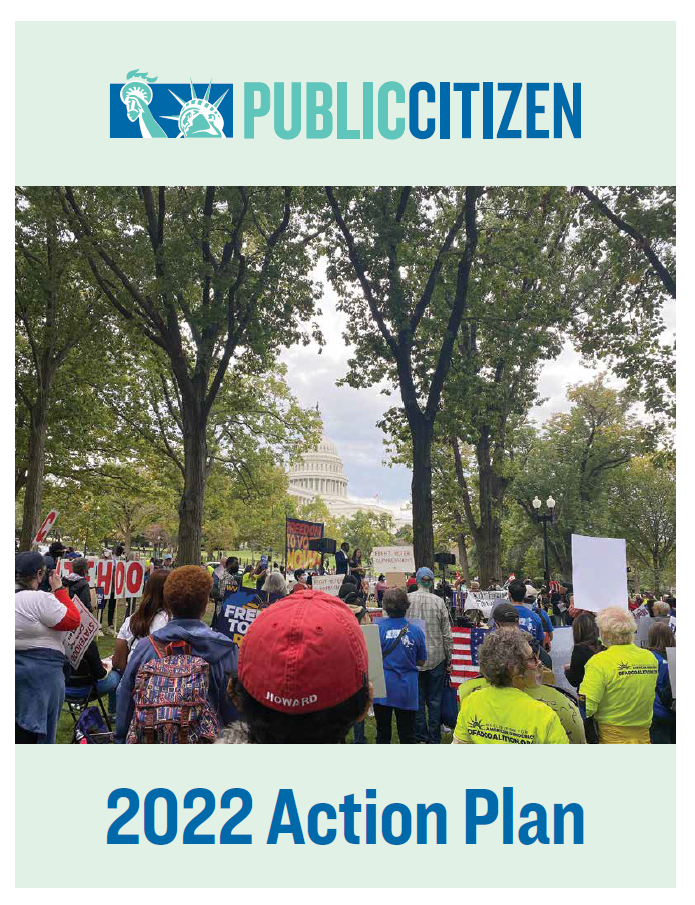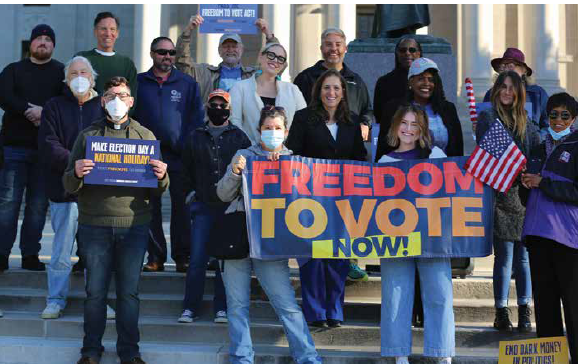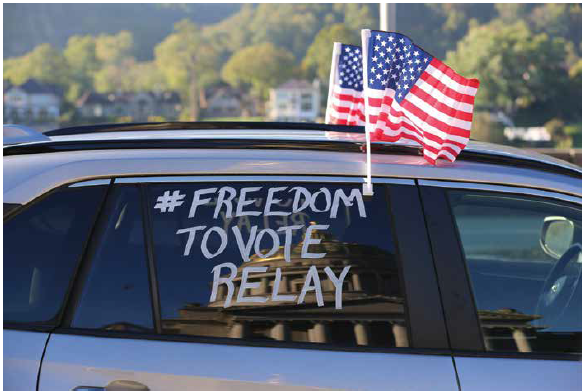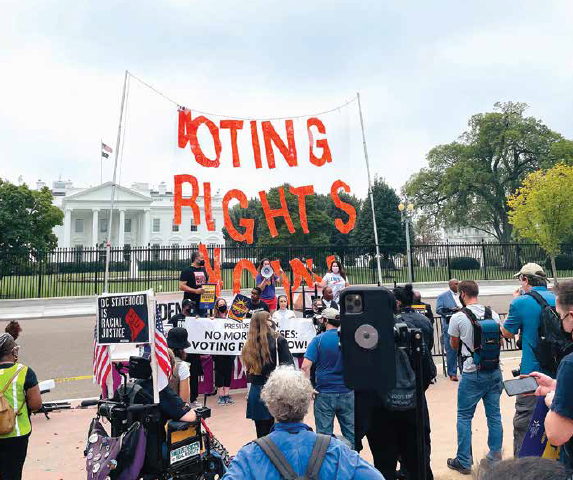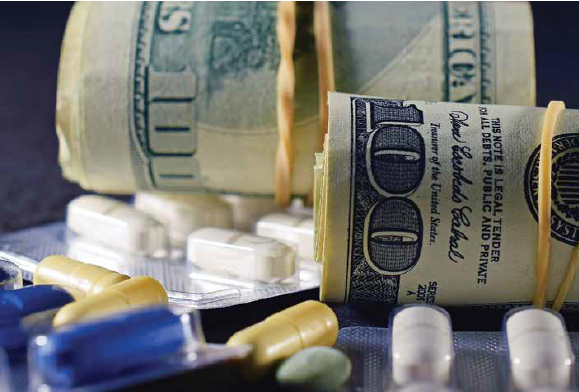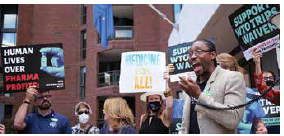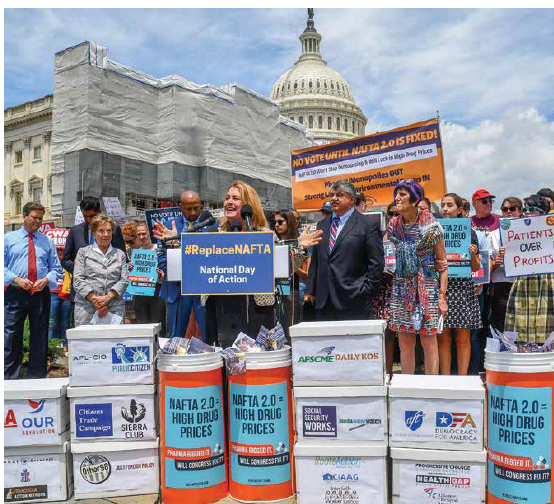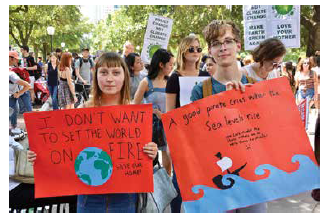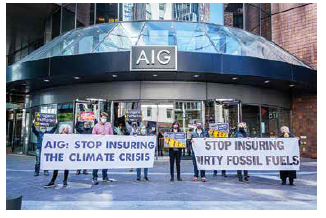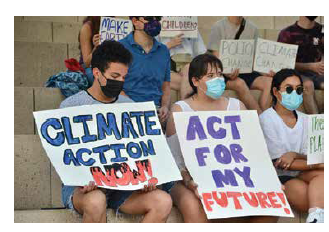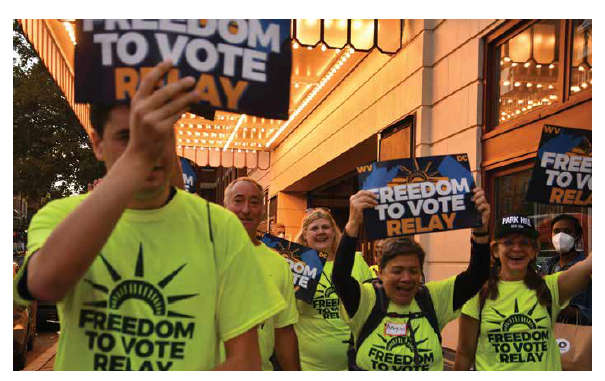Public Citizen 2022 Action Plan
Click Here to Download a PDF of the 2022 Action Plan
Protecting, Preserving and
Advancing Democracy
It’s no exaggeration to say that the American democratic experiment is under assault.
Against the basic notion of one person, one vote stands the reality of Big Money dominance: A mere 100 individuals are responsible for 70 percent of all Super PAC contributions!
And the money is growing ever-more consequential. The coming elections will be the most expensive midterms ever—with as much as two times more spent than any previous midterm election. (Yes, groan for all the ads you will have to suffer through but shed a tear for what it means about our democracy.)
Meanwhile, we are witnessing a reversal of core voting rights that seemed unfathomable for the last half century.
- The Supreme Court has gutted the Voting Rights Act—and states are leaping at the chance to target voters of color and make it harder to vote.
- In 2021 alone, more than 400 bills have been proposed in virtually every state to restrict the freedom to vote—and more than 30 voting restriction laws have been passed in 19 states.
Amazingly, that’s not all. Now we’re facing outright election sabotage—the prospect that state legislators will overturn the actual vote count and declare as winner someone who did not receive the most votes.
At least eight states, including Arizona and Georgia, have enacted 10 laws in 2021 that change election laws to give more power to legislatures or partisan entities and strip power election duties from secretaries of state.
We’re not going to let this slow-motion coup succeed.
Four years ago, we pulled together what has now become the major, nationwide prodemocracy coalition.
I don’t have enough time to list for you all the town halls, rallies, creative actions, petitions, emails, letters and telephone calls to members of Congress, letters to the editor, lobby meetings and much, much more that we have done in the last several years to win transformative democracy legislation—legislation not just to prevent and undo the abuses we just reviewed but also to fundamentally strengthen and advance our democracy.
The filibuster has slowed but not defeated us.
We are on the precipice of winning major democracy legislation and we’re going to get it done this year, the filibuster be damned.
In these next weeks and months, we’re throwing everything we have at winning passage of the Freedom to Vote and John Lewis Voting Rights Advancement Act, legislation that would end Dark Money, secure the right to vote, establish automatic voter registration, prevent election sabotage and much more.
Getting it done requires Sens. Manchin and Sinema agreeing to a filibuster workaround, it’s as simple as that.
Addressing the Global Pandemic
As significant as vaccine problems remain in the United States, they are nothing compared to the developing world, where the key issue is access to supply, not hesitancy. The rich country vaccination rate is 33 times higher than in poor countries.
Think about that for a moment.
Meanwhile, the rich countries that house the vaccine makers have NO global plan to vaccinate the world.
This is a humanitarian outrage—and makes it far more difficult to contain the pandemic in the United States, as we (and others) predicted, and is now being evidenced by the spread of the Delta variant.
Having won a shift in U.S. policy on the issue of patent protection for COVID vaccines, we are now pushing for a global manufacturing plan. Global vaccination won’t come from fighting over limited supply. We need to vastly scale up production.
Public Citizen’s research and expertise is driving the public debate on this issue. Our $25 billion manufacturing plan remains the most detailed plan available to scale up global manufacturing and to force the vaccine makers to share their technology. The New York Times, the Los Angeles Times and many others have endorsed the plan.
Our advocacy in this space involves everything from legal analysis of U.S. authority to pursue our plan to contracting for expert analyses on the costs of starting up new mRNA vaccine manufacturing plants, from holding a periodic newsmaker webinar series (including, for example, the head of the African CDC) to organizing protests.
Moving forward, we will pursue three major advocacy prongs:
1. Win funding from Congress for global manufacturing.
2. Persuade the Biden administration to embrace its existing authorities and to facilitate a scaled-up manufacturing plan.
3. Help facilitate a network of vaccine manufacturing facilities around the world to respond quickly to any future pandemics.
To drive the work, we are combining more expert analysis, intensive lobbying, polling, a full-scale communication effort, coalition building, grassroots mobilization and strategically timed protests and stunts.
We are witnessing one of the great moral failures of our time. Millions of people will die simply because we don’t share technology and scale up production. Hundreds of millions will be forced to live in dire poverty because of pandemic-related lockdowns. And even in the United States, we will be hobbled for as long as the global pandemic lasts. The International Chamber of Commerce estimates that failing to end the pandemic will cost the U.S. a minimum of $45 billion—and possibly 20 times more than that.
I’ll tell you what: We’re not going to stand by and witness this.
We’re going to change it. We’ve already made a difference—forcing key changes in U.S. policy and significantly increasing U.S. vaccination donations—but with your help, we are going to do a lot more than that.
Ending Drug Company Price-Gouging
The seemingly endless debates about the Build Back Better plan appear close to being resolved.
One key element will be lowering the cost of prescription drugs and using the savings to fund vital health programs.
Public Citizen has done more than any single entity to force prescription drug pricing abuse onto the agenda and to develop the policy agenda to lower drug prices.
We have long led the way in documenting drug company price abuses—and proposing fundamental reform, focused on limiting the companies’ monopoly power, garnering support on Capitol Hill and building powerful coalitions for far-reaching reform.
We played a crucial role in 2018-2019 in strengthening House of Representatives proposals to empower Medicare to negotiate drug prices. Those proposals became the basis of the drug pricing provisions of the Build Back Better Act.
Cutting drug prices is the most popular component of the overwhelmingly popular Build Back Better agenda. That’s because price gouging is so severe, and the issue so deeply felt—sometimes even a life-and-death matter—for many people across the nation.
It matters that making medicines affordable is so popular. Moving on this issue will prove to people that the government CAN work for them and deliver real change, that the system isn’t completely rigged. That’s why it’s important we win.
But taking on drug pricing is also the component of Build Back Better that runs up against the strongest lobby: Big Pharma.
A small number of Big Pharma-allegiant representatives and senators are working to water down the drug pricing provisions in the Build Back Better legislation. We’re going to wind up with something, but much less than it should be.
Still, we’ll take credit for the victory we win—and the hundreds of billions in savings generated.
And we’ll use that victory—the first meaningful drug pricing reform since 1984—to power our campaign forward.
Big Pharma has always feared that any loss on drug pricing policy would open the floodgates to more reform.
We’re going to show the industry was right to be scared.
Once the Build Back Better Act is passed, we’re going to set to work on follow-up legislation to expand Medicare negotiating power and other measures to combat price-gouging.
We’re also going to lobby the Biden administration to use existing legal authority to lower drug prices. The administration is prioritizing taking on monopolies—and we have some ideas for them!
Foremost among them is using “march-in” authority to authorize generic competition for excessively priced drugs that were developed with government support.
Our full-throated advocacy plan includes:
- Coordinating the main drug pricing advocacy table.
- Educating and activating the public, including through social media and email actions.
- Cutting-edge research on everything from the particulars of drug company contracts with government to industry executive pay.
- Technical analysis of key legislative and administrative proposals.
- Coordination with Congressional leaders and key champions.
- Advocacy and coordination with key executive branch agencies to deliver on the public’s demand to end Big Pharma’s price-gouging.
Defunding Dirty Energy
The Tigris-Euphrates region—the cradle of civilization—is now drying up. People are fast migrating out and the area may soon be entirely depopulated … The Lancet reports that climate change will become the “defining narrative of human health.” … The Swiss Alps is on target to lose two thirds of its ice volume.
Those missives are from one 24-hour news cycle. Every day brings new information on the cataclysm humanity faces from unchecked climate change.
It’s too late to stop climate change, but whether it’s a severe-but-manageable disruption or a civilization-threatening process is up to us.
The decisions we make now will impact humanity’s future for centuries … or perhaps all time. And, so far, we’re not making good decisions.
Accelerating away from fossil fuels and toward the transition to clean energy requires multiple strategies.
Along with our advocacy for major governmental investments in renewables and strong national standards, we are carving out a role in the climate/finance space.
What does that mean? Two things. First, we are leading the effort to hold financial institutions accountable for their role in financing climate-destroying activities. Second, we are pushing financial regulators to infuse climate risk into their analysis of the issues facing banks and financial institutions.
Our underlying theory? Follow the money.
If carbon polluters can’t get financing, they can’t undertake new projects.
Along with public pressure, the key to making this approach stick is to explain how climate is in fact a financial risk.
New investments in pipelines, natural gas or oil drilling do not make sense because the world is going to shift away from dirty energy.
Investments now are much riskier as a business proposition than the markets are recognizing.
We are running a focused campaign targeting the insurer AIG and pushing a broad agenda with financial regulators. We are optimistic that the Securities and Exchange Commission (SEC) will soon require publicly traded companies to disclose their climate risk, which we think will prompt meaningful changes in investment strategies.
Going forward, our workplan includes:
- Pushing for nomination of financial regulators who favor addressing the climate crisis.
- Working with and pressuring financial regulators to undertake action.
- Publishing detailed, expert commentary—in the form of comment letters and otherwise—that explain how to implement climate commitments at agencies such as the SEC (e.g., what should companies be required to disclose about climate pollution, what units of measurement should they use and what third parties, if any, should verify their claims) and the Commodities Futures Trading Commission (CFTC).
- Pushing the Federal Reserve, Treasury Department and other agencies to start including climate as a factor in their prudential regulation.
- Working with state insurance regulators to impose climate targets on insurers, following the breakthrough approach we helped win in Connecticut.
- Campaigning against AIG as a leading insurer and financer of fossil fuel projects, with the aim of winning measurable commitments from the company to reverse its practices.
That’s only part of what we’re doing! We have a lot more going on, such as driving climate action plans in all major cities of Texas. We’re advocating for major federal investments in clean energy. We’re pushing for stronger vehicle fuel efficiency, including in a major lawsuit. We’re leading the way for a workplace safety rule to protect workers— especially immigrant farm workers—from deadly heat exposure. We’re pushing to end oil leasing on federal lands. We’re pushing for innovative systems of public participation at the Federal Energy Regulatory Commission that would empower tribes and affected communities to push back against natural gas development schemes.
There’s not going to be any single win that solves climate change. It’s going to take years of work, building awareness and public demand for action. We’re going to have to pile up victories—and use that momentum to make even more advances. The effort to decarbonize the planet is going to reach every nook and cranny of the global economy.
For Public Citizen, as always, we’re driven by where we can make a strategic difference.
The climate/finance area reflects that we can capitalize on our expertise. We’re confident we can impact policy makers—in fact, we’re already seeing that. We believe this strategic intervention will have broad ripple effects throughout the economy.
With your help, we’re going to lean in even more on the climate fight, call on our strategic savvy and make a real difference.
Additional Areas of Focus
As enormous as these campaigns are, they represent only a portion of what we’re doing. Other key priorities include:
- Taking on Big Tech. We played a key supporting role in drafting far-reaching anti-monopoly legislation that has passed the House Judiciary Committee and will hopefully be voted on by the full House next year.
- Watchdogging the Food and Drug Administration (FDA). We continue our long-term, cutting-edge work to advance drug safety and to ensure the FDA stays independent from industry. We’ve played a key role in blocking several industry-connected candidates to be FDA commissioner.
- Litigating for corporate accountability. We’re winning cases in the federal appeals courts to uphold the liability of nursing homes and meat packing facilities that recklessly exposed patients and workers to the coronavirus. (In some cases, nursing homes forbade staff from wearing masks!)
- Preventing Facebook from launching a global currency. The company aims to create a global cryptocurrency that would, to a considerable extent, replace the dollar and other national currencies. We stopped an earlier iteration of this scheme and we’re going to stop the next one, too.
- Making corporations and the super-rich pay their fair share of taxes in order to redress the nation’s severe wealth and income inequality and to fund vitally needed programs.
Partnering With You
This is a rare moment in American history, with unparalleled threats to democratic functioning developing side-by-side with extraordinary opportunities to win transformative change.
To a considerable extent, these openings represent two sides of the same coin: if we fail to capitalize on the opportunity for transformative change, the nightmare scenarios grow far more likely.
We’re always eyes wide open about the real threats facing the nation and world—and the challenges now are as great as they’ve been in generations. And we surely understand the power of those who oppose progress.
But we’re also relentlessly optimistic.
We know we can accomplish great things, because that’s exactly what we’ve done for 50 years.
All along the way, that’s been a partnership.
You power our work.
